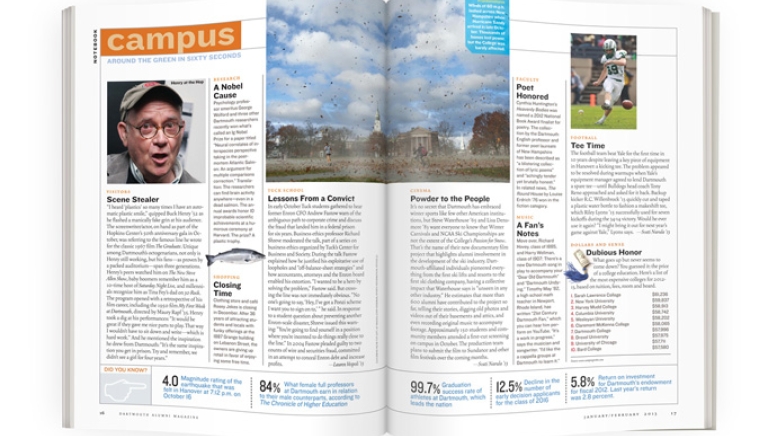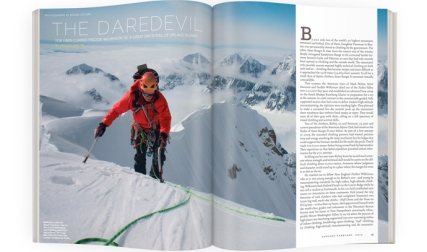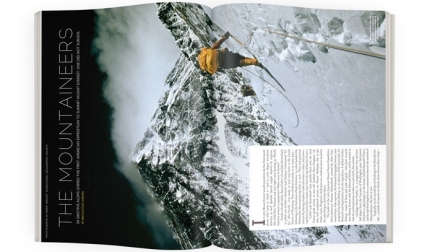Scene Stealer
“I heard ‘plastics’ so many times I have an automatic plastic smile,” quipped Buck Henry ’52 as he flashed a manically fake grin at his audience. The screenwriter and actor, on hand as part of the Hopkins Center’s 50th anniversary gala in October, was referring to the famous line he wrote for the classic 1967 film The Graduate. Unique among Dartmouth’s octogenarians, not only is Henry still working, but his fans—as proven by a packed auditorium—span three generations. Henry’s peers watched him on The New Steve Allen Show, baby boomers remember him as a 10-time host of Saturday Night Live, and millennials recognize him as Tina Fey’s dad on 30 Rock. The program opened with a retrospective of his film career, including the 1950 film My First Week at Dartmouth, directed by Maury Rapf ’35. Henry took a dig at his performances: “It would be great if they gave me nice parts to play. That way I wouldn’t have to sit down and write—which is hard work.” And he mentioned the inspiration he drew from Dartmouth: “It’s the same inspiration you get in prison. Try and remember, we didn’t see a girl for four years.”
A Nobel Cause
Psychology professor emeritus George Wolford and three other Dartmouth researchers recently won what’s called an Ig Nobel Prize for a paper titled “Neural correlates of interspecies perspective taking in the post-mortem Atlantic Salmon: An argument for multiple comparisons correction.” Translation: The researchers can find brain activity anywhere—even in a dead salmon. The annual awards honor 10 improbable scientific achievements at a humorous ceremony at Harvard. The prize? A plastic trophy.
Closing Time
Clothing store and café Rosey Jekes is closing in December. After 36 years of attracting students and locals with funky offerings at the 1887 Grange building on Lebanon Street, the owners are giving up retail in favor of enjoying some free time.
Lessons From a Convict
In early October Tuck students gathered to hear former Enron CFO Andrew Fastow warn of the ambiguous path to corporate crime and discuss the fraud that landed him in a federal prison for six years. Business ethics professor Richard Shreve moderated the talk, part of a series on business ethics organized by Tuck’s Center for Business and Society. During the talk Fastow explained how he justified his exploitative use of loopholes and “off-balance-sheet strategies” and how accountants, attorneys and the Enron board enabled his extortion. “I wanted to be a hero by solving the problem,” Fastow said. But crossing the line was not immediately obvious. “No one’s going to say, ‘Hey, I’ve got a Ponzi scheme I want you to sign on to,’ ” he said. In response to a student question about preventing another Enron-scale disaster, Shreve issued this warning: “You’re going to find yourself in a position where you’re incented to do things really close to the line.” In 2004 Fastow pleaded guilty to two counts of wire and securities fraud, committed in an attempt to conceal Enron debt and increase profits. —Lauren Vespoli ’13
Powder to the People
It’s no secret that Dartmouth has embraced winter sports like few other American institutions, but Steve Waterhouse ’65 and Lisa Densmore ’83 want everyone to know that Winter Carnivals and NCAA Ski Championships are not the extent of the College's Passion for Snow. That’s the name of their new documentary film project that highlights alumni involvement in the development of the ski industry. Dartmouth-affiliated individuals pioneered everything from the first ski lifts and resorts to the first ski clothing company, having a collective impact that Waterhouse says is “unseen in any other industry.” He estimates that more than 600 alumni have contributed to the project so far, telling their stories, digging old photos and videos out of their basements and attics, and even recording original music to accompany footage. Approximately 150 students and community members attended a first-cut screening on campus in October. The production team plans to submit the film to Sundance and other film festivals over the coming months. —Svati Narula ’13
Poet Honored
Cynthia Huntington’s Heavenly Bodies was named a 2012 National Book Award finalist for poetry. The collection by the Dartmouth English professor and former poet laureate of New Hampshire has been described as “a blistering collection of lyric poems” and “achingly tender yet brutally honest.” In related news, The Round House by Louise Erdrich ’76 won in the fiction category.
A Fan’s Notes
Move over, Richard Hovey, class of 1885, and Harry Wellman, class of 1907: There’s a new Dartmouth song in play to accompany your “Dear Old Dartmouth” and “Dartmouth Undying.” Timothy May ’82, a high school math teacher in Newport, Rhode Island, has written “21st Century Dartmouth Fan,” which you can hear him perform on YouTube. “It’s a work in progress,” says the musician and songwriter. “I’d like the a cappella groups at Dartmouth to learn it.”
Tee Time
The football team beat Yale for the first time in 10 years despite leaving a key piece of equipment in Hanover: a kicking tee. The problem appeared to be resolved during warmups when Yale’s equipment manager agreed to lend Dartmouth a spare tee—until Bulldogs head coach Tony Reno approached and asked for it back. Backup kicker R.C. Willenbrock ’13 quickly cut and taped a plastic water bottle to fashion a makeshift tee, which Riley Lyons ’15 successfully used for seven kickoffs during the 34-14 victory. Would he ever use it again? “I might bring it out for next year’s game against Yale,” Lyons says. —Svati Narula ’13
Dubious Honor
What goes up but never seems to come down? You guessed it: the price of a college education. Here’s a list of the most expensive colleges for 2012-13, based on tuition, fees, room and board.





